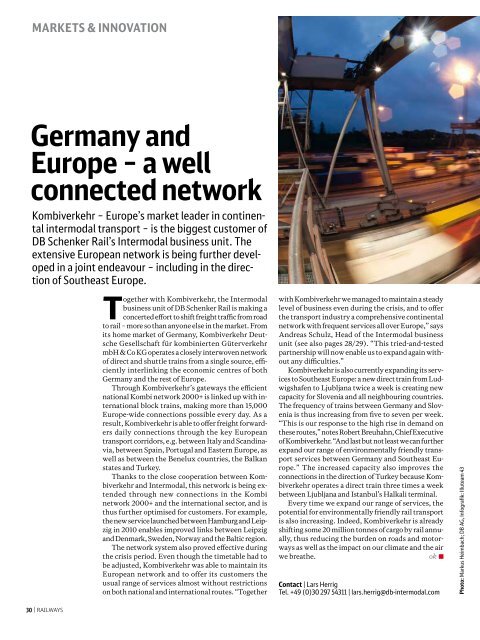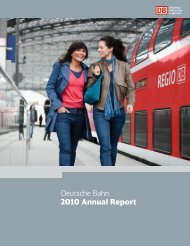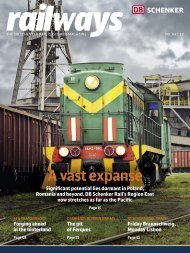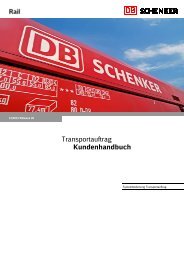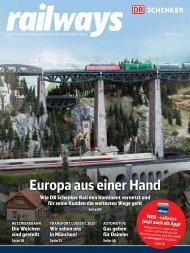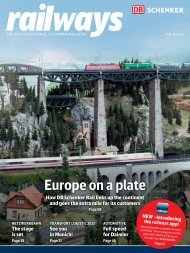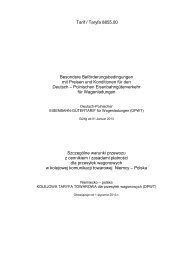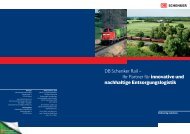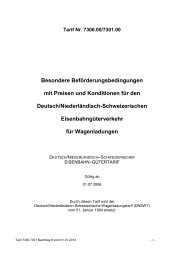PDF Download - DB Schenker Rail Deutschland AG
PDF Download - DB Schenker Rail Deutschland AG
PDF Download - DB Schenker Rail Deutschland AG
Create successful ePaper yourself
Turn your PDF publications into a flip-book with our unique Google optimized e-Paper software.
markEts & INNovatIoN<br />
Germany and<br />
Europe – a well<br />
connected network<br />
Kombiverkehr – Europe’s market leader in continental<br />
intermodal transport – is the biggest customer of<br />
<strong>DB</strong> <strong>Schenker</strong> <strong>Rail</strong>’s Intermodal business unit. The<br />
extensive European network is being further developed<br />
in a joint endeavour – including in the direction<br />
of Southeast Europe.<br />
30 | <strong>Rail</strong>ways<br />
Together with Kombiverkehr, the Intermodal<br />
business unit of <strong>DB</strong> <strong>Schenker</strong> <strong>Rail</strong> is making a<br />
concerted effort to shift freight traffic from road<br />
to rail – more so than anyone else in the market. From<br />
its home market of Germany, Kombiverkehr Deutsche<br />
Gesellschaft für kombinierten Güterverkehr<br />
mbH & Co KG operates a closely interwoven network<br />
of direct and shuttle trains from a single source, efficiently<br />
interlinking the economic centres of both<br />
Germany and the rest of Europe.<br />
Through Kombiverkehr’s gateways the efficient<br />
national Kombi network 2000+ is linked up with international<br />
block trains, making more than 15,000<br />
Europe-wide connections possible every day. As a<br />
result, Kombiverkehr is able to offer freight forwarders<br />
daily connections through the key European<br />
transport corridors, e.g. between Italy and Scandinavia,<br />
between Spain, Portugal and Eastern Europe, as<br />
well as between the Benelux countries, the Balkan<br />
states and Turkey.<br />
Thanks to the close cooperation between Kombiverkehr<br />
and Intermodal, this network is being extended<br />
through new connections in the Kombi<br />
network 2000+ and the international sector, and is<br />
thus further optimised for customers. For example,<br />
the new service launched between Hamburg and Leipzig<br />
in 2010 enables improved links between Leipzig<br />
and Denmark, Sweden, Norway and the Baltic region.<br />
The network system also proved effective during<br />
the crisis period. Even though the timetable had to<br />
be adjusted, Kombiverkehr was able to maintain its<br />
European network and to offer its customers the<br />
usual range of services almost without restrictions<br />
on both national and international routes. “Together<br />
with Kombiverkehr we managed to maintain a steady<br />
level of business even during the crisis, and to offer<br />
the transport industry a comprehensive continental<br />
network with frequent services all over Europe,” says<br />
Andreas Schulz, Head of the Intermodal business<br />
unit (see also pages 28/29). “This tried-and-tested<br />
partnership will now enable us to expand again without<br />
any difficulties.”<br />
Kombiverkehr is also currently expanding its services<br />
to Southeast Europe: a new direct train from Ludwigshafen<br />
to Ljubljana twice a week is creating new<br />
capacity for Slovenia and all neighbouring countries.<br />
The frequency of trains between Germany and Slovenia<br />
is thus increasing from five to seven per week.<br />
“This is our response to the high rise in demand on<br />
these routes,” notes Robert Breuhahn, Chief Executive<br />
of Kombiverkehr. “And last but not least we can further<br />
expand our range of environmentally friendly transport<br />
services between Germany and Southeast Europe.”<br />
The increased capacity also improves the<br />
connections in the direction of Turkey because Kombiverkehr<br />
operates a direct train three times a week<br />
between Ljubljana and Istanbul’s Halkali terminal.<br />
Every time we expand our range of services, the<br />
potential for environmentally friendly rail transport<br />
is also increasing. Indeed, Kombiverkehr is already<br />
shifting some 20 million tonnes of cargo by rail annually,<br />
thus reducing the burden on roads and motorways<br />
as well as the impact on our climate and the air<br />
we breathe. ok<br />
Contact | Lars Herrig<br />
Tel. +49 (0)30 297 54311 | lars.herrig@db-intermodal.com<br />
Photo: Markus Heimbach; <strong>DB</strong> <strong>AG</strong>, Infografik: Illuteam 43


